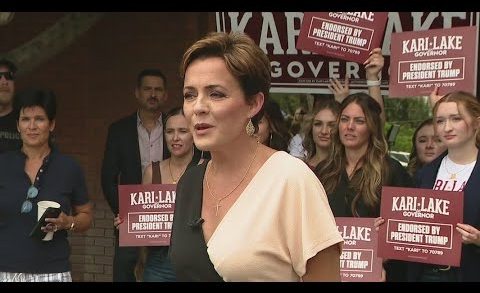Are you curious about Kari Lake’s stance on energy policy? As a researcher in the field, I have delved into her position to provide you with a detailed overview. Let’s take a closer look at where Kari Lake stands on this crucial issue.
1. **Support for Traditional Energy Sources**: Kari Lake has expressed strong support for traditional energy sources such as oil and natural gas. She believes that these resources are essential for powering our economy and ensuring energy security. Lake has emphasized the importance of maintaining a diverse energy portfolio that includes these reliable sources.
2. **Opposition to Overregulation**: Lake is a vocal critic of overregulation in the energy sector. She argues that excessive regulations stifle innovation and drive up costs for consumers. Lake has called for a more balanced approach that promotes responsible energy development while protecting the environment.
3. **Advocacy for Energy Independence**: Lake has highlighted the importance of achieving energy independence for the United States. She believes that relying on domestic energy sources strengthens national security and reduces our dependence on foreign oil. Lake has proposed policies aimed at boosting domestic energy production to achieve this goal.
4. **Emphasis on Renewable Energy**: While Lake is a proponent of traditional energy sources, she also recognizes the potential of renewable energy technologies. She supports the development of renewable energy sources such as solar and wind power as part of a diversified energy strategy. Lake believes in harnessing the power of innovation to drive progress in the renewable energy sector.
5. **Promotion of Energy Innovation**: Lake has called for increased investment in energy innovation to drive technological advancements in the sector. She believes that investing in research and development will lead to breakthroughs in clean energy technologies and help address climate change. Lake has advocated for policies that incentivize innovation and entrepreneurship in the energy industry.
In conclusion, Kari Lake’s position on energy policy is multifaceted, encompassing support for traditional energy sources, opposition to overregulation, advocacy for energy independence, emphasis on renewable energy, and promotion of energy innovation. By taking a balanced approach to energy policy, Lake aims to secure a reliable and sustainable energy future for the United States.
Breaking Down the Current Energy Policy: What You Need to Know
Are you curious about Kari Lake’s position on energy policy? Let’s break down the current energy policy and provide you with the information you need to know.
First and foremost, **Kari Lake** has voiced her support for **increased investment in renewable energy sources** such as solar and wind power. She believes that transitioning to clean energy is crucial for **reducing greenhouse gas emissions** and combating climate change. Lake advocates for **incentives for renewable energy** companies to encourage their growth and development.
Additionally, Kari Lake is in favor of **expanding nuclear energy** as a clean and reliable power source. She argues that nuclear power can help **reduce dependence on fossil fuels** and provide a stable energy supply. Lake supports **modernizing and upgrading existing nuclear power plants** to ensure their safety and efficiency.
In conclusion, Kari Lake’s position on energy policy focuses on **promoting renewable energy** and **expanding nuclear power** to create a more sustainable and secure energy future. By understanding her stance on these issues, you can gain insight into her overall approach to tackling energy challenges.
Exploring the United States’ Stance on Renewable Energy: An In-Depth Look at Policy and Progress
**What is Kari Lake’s position on energy policy?**
When delving into Kari Lake’s stance on energy policy, it becomes evident that she emphasizes the importance of promoting **renewable energy** sources. She advocates for the increased use of solar, wind, and other sustainable energy options to reduce the United States’ dependency on fossil fuels. Lake believes that transitioning to renewable energy is not only essential for combating **climate change** but also for creating new **job opportunities** and fostering economic growth.
In her approach to energy policy, Kari Lake supports the implementation of **government incentives** to encourage the adoption of renewable energy technologies. She believes that offering tax credits and grants to individuals and businesses investing in clean energy solutions can help accelerate the transition towards a more sustainable future. Lake also emphasizes the need for **regulatory frameworks** that prioritize renewable energy development and set ambitious **targets for carbon emissions reduction**.
In conclusion, Kari Lake’s position on energy policy aligns with the growing global consensus on the importance of transitioning to renewable energy sources. By advocating for government incentives and regulatory frameworks that support clean energy initiatives, Lake aims to drive progress towards a more sustainable and environmentally friendly energy landscape in the United States.
Exploring the Key Components of an Effective Energy Policy
Are you curious about Kari Lake’s position on energy policy? While specifics may vary, exploring the key components of an effective energy policy can provide valuable insights into her potential stance. Let’s delve into the critical aspects that make up a robust energy policy to gain a better understanding of the topic.
**1. Diversification of Energy Sources:** One essential component of an effective energy policy is the diversification of energy sources. By incorporating a mix of renewable energy, such as solar, wind, and hydroelectric power, alongside traditional sources like natural gas and nuclear energy, a country can enhance its energy security and reduce reliance on a single source.
**2. Energy Efficiency and Conservation:** Another key aspect is promoting energy efficiency and conservation measures. Implementing policies that encourage the use of energy-efficient technologies, improve building insulation, and incentivize the adoption of energy-saving practices can help reduce overall energy consumption and lower greenhouse gas emissions.
**3. Grid Modernization:** A modernized energy grid is vital for ensuring a reliable and resilient energy supply. Investing in smart grid technology, energy storage systems, and grid infrastructure upgrades can enhance the efficiency of energy distribution, integrate renewable energy sources more effectively, and support the transition to a cleaner energy future.
**4. Environmental Protection:** An effective energy policy should also prioritize environmental protection by setting emissions reduction targets, promoting clean air and water regulations, and supporting initiatives to mitigate the impacts of climate change. Balancing energy production with environmental sustainability is crucial for long-term energy security and the well-being of future generations.
**5. Stakeholder Engagement:** Engaging stakeholders, including government agencies, industry representatives, environmental groups, and local communities, is essential for developing a comprehensive energy policy that considers diverse perspectives and addresses the needs of all parties involved. Collaboration and communication are key to building consensus and implementing successful energy initiatives.
By exploring these key components of an effective energy policy, we can gain valuable insights into the priorities and values that shape Kari Lake’s position on energy policy. Whether focusing on diversifying energy sources, promoting energy efficiency, modernizing the grid, protecting the environment, or engaging stakeholders, a well-rounded energy policy can pave the way for a sustainable and secure energy future.
In conclusion, Kari Lake’s position on energy policy emphasizes a balanced approach that prioritizes energy independence, innovation, and environmental stewardship. She advocates for a diverse energy portfolio that includes traditional sources like oil and gas, as well as renewable energy sources such as solar and wind power. Lake believes in promoting energy policies that support economic growth while also protecting the environment for future generations.
**Frequently Asked Questions:**
**1. What specific policies has Kari Lake proposed to address energy issues in Arizona?**
**2. How does Kari Lake plan to balance the needs of the energy industry with environmental concerns?**
**3. What is Kari Lake’s stance on climate change and its impact on energy policy?**
**4. How does Kari Lake plan to support renewable energy development in Arizona?**
In summary, Kari Lake’s energy policy position reflects a pragmatic approach that seeks to find common ground between industry interests and environmental protection. By advocating for a diverse energy portfolio and promoting innovation in the energy sector, Lake aims to ensure a sustainable future for Arizona’s energy needs.



